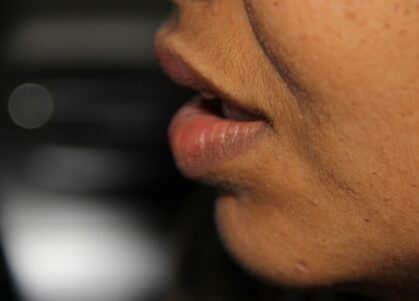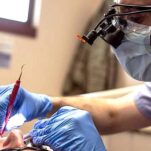Personal Diagnosis
Our consultant will conduct a thorough examination of your mouth, as part of a complete head and neck assessment. Discussing your medical history and any ongoing treatments may provide valuable insights.
Many oral lesions can be identified by an experienced consultant, who will then develop a personalised treatment plan for you.
If further information is needed to confirm a diagnosis, a biopsy may be required. This involves carefully removing a small sample, or in some cases, the entire lesion, for detailed laboratory analysis under a microscope.
A biopsy is a quick procedure, typically lasting 15 to 30 minutes, and is performed under local anaesthetic. It is the gold standard for diagnosing a wide range of oral lesions.
In some cases, a few dissolvable stitches may be needed, but any discomfort or swelling is usually minimal. Most people can resume normal activities, including driving, travelling, or returning to work, on the same day.
Treating Oral Lesions
A biopsy can confirm whether a lesion is benign, premalignant, or cancerous. The most common type of oral cancer is squamous cell carcinoma.
Treatment varies depending on the diagnosis, but in most cases, minor day surgery to remove the lesion is the best solution. However, it is important to remember that oral lesions and ulcers have many causes besides cancer.
These can include accidental biting, ill-fitting dentures, certain foods and drinks, infections, or underlying medical conditions such as those mentioned earlier.
Because oral lesions have many possible causes, treatment options also vary. These may include:
- Topical corticosteroids to reduce inflammation
- Anti-inflammatory or antimicrobial treatments, available as dissolvable tablets, inhalers, or mouthwashes
- Systemic medication for more severe cases
- Improved oral hygiene routines to prevent secondary infections
Care at Our London Clinic
Your treatment will be tailored to the type and severity of your condition, with careful consideration given to pain levels, how frequently lesions occur, and how well they have responded to previous treatment.
We understand that oral conditions can have both physical and psychological impacts, which is why we provide compassionate, personalised care.
Our clinic offers a full range of treatments, from minor procedures in our day unit to advanced care in leading London hospitals that we partner with. If dental problems or jaw issues are contributing to your condition, we can also manage these in-house.
Having expert support on-site allows us to provide a fully coordinated treatment plan. If you have any concerns, our friendly team is here to help, please don’t hesitate to get in touch.





